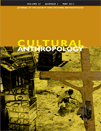
CULTURAL ANTHROPOLOGY
Scope & Guideline
Unveiling the Nuances of Cultural Narratives
Introduction
Aims and Scopes
- Cultural Practices and Social Dynamics:
The journal investigates how cultural practices shape social dynamics and individual identities, focusing on rituals, traditions, and everyday life across different communities. - Power and Politics:
Cultural Anthropology critically examines the intersections of power, politics, and ethics, exploring how these dimensions influence cultural expressions and social relations. - Migration and Displacement:
The journal addresses contemporary issues of migration and displacement, analyzing the experiences of migrants and refugees, as well as the socio-political contexts surrounding these phenomena. - Environmental Anthropology:
A core area of focus is the relationship between humans and their environments, including discussions on sustainability, ecological ethics, and the impact of climate change on cultural practices. - Ethics and Activism:
Cultural Anthropology emphasizes ethical considerations in research and the role of activism in addressing social injustices, particularly in marginalized communities. - Interdisciplinary Approaches:
The journal encourages interdisciplinary methodologies, drawing from fields such as sociology, history, and political science to enrich anthropological discourse.
Trending and Emerging
- Humanitarianism and Migration:
There is an increasing focus on humanitarian issues related to migration, exploring the complexities of refugee experiences, state responses, and the ethics of aid in contemporary contexts. - Environmental Justice:
Emerging discussions center on environmental justice, highlighting the intersection of ecology, culture, and social movements, especially in response to climate change and resource exploitation. - Digital Anthropology:
The integration of digital technologies in anthropological research is gaining traction, with studies examining how digital platforms shape social interactions, identities, and cultural expressions. - Intersectionality and Identity Politics:
Recent themes explore intersectionality, particularly in the context of race, gender, and class, analyzing how these factors influence individual and collective experiences. - Ethics of Care and Activism:
There is a growing emphasis on the ethics of care in anthropology, focusing on activist approaches and the responsibilities of researchers towards the communities they study.
Declining or Waning
- Traditional Ethnographic Methods:
While ethnography remains foundational, there is a noticeable decline in traditional ethnographic studies that solely rely on long-term fieldwork without integrating contemporary issues or methodologies. - Universalist Narratives:
The tendency to frame anthropological discussions within universalist narratives is diminishing, as the field increasingly prioritizes localized, context-specific analyses over broad generalizations. - Focus on Western Cultures:
There has been a shift away from studies centered predominantly on Western cultures, as the journal increasingly highlights non-Western perspectives and global south experiences. - Static Cultural Representations:
The portrayal of cultures as static entities is decreasing, with more emphasis on dynamic, fluid representations of cultural identities and practices. - Overemphasis on Historical Contexts:
While historical contexts are important, there is a trend towards prioritizing contemporary issues and future-oriented discussions over purely historical analyses.
Similar Journals
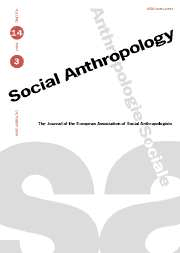
Social Anthropology
Unraveling the Threads of Social PracticeSocial Anthropology is a leading journal published by BERGHAHN JOURNALS, focusing on the diverse and dynamic field of anthropology. With an ISSN of 0964-0282 and an E-ISSN of 1469-8676, this open-access journal has been a cornerstone of scholarly communication since its inception in 1982, becoming fully accessible to the public since 2022. Situated in the United States, the journal aims to disseminate high-quality research that explores sociocultural dimensions of human behavior across various contexts, addressing pressing contemporary issues through a multidisciplinary lens. With impressive rankings, including Q2 in Anthropology and Arts and Humanities, and strong positions in Sociology and Developmental Psychology according to Scopus metrics, Social Anthropology serves as an essential platform for researchers, professionals, and students committed to advancing our understanding of social practices and cultural norms. Its commitment to fostering intellectual discourse makes it a vital resource for those seeking to deepen their knowledge and insight into the anthropological landscape.

CRITIQUE OF ANTHROPOLOGY
Elevating Scholarly Dialogue in AnthropologyCRITIQUE OF ANTHROPOLOGY, published by SAGE PUBLICATIONS LTD, stands as a vital platform in the field of anthropology, contributing significantly to the discourse surrounding cultural practices and societal norms since its inception in 1974. Recognized for its scholarly rigor, this esteemed journal holds a Q2 category ranking in both Anthropology and Arts and Humanities as of 2023, with impressive standings in Scopus, including a rank of 55 out of 502 in Social Sciences and 107 out of 552 in Arts and Humanities. The journal's extensive scope—from theoretical critiques to empirical studies—facilitates a rich exchange of ideas among researchers, professionals, and students, thereby enriching the anthropology community. Although CRITIQUE OF ANTHROPOLOGY does not provide open access, its prestigious reputation and impact on the field make it an essential resource for those seeking to deepen their understanding of anthropological scholarship.
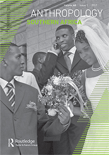
Anthropology Southern Africa
Elevating the discourse in anthropology and cultural studies.Anthropology Southern Africa is a prestigious journal published by Routledge Journals, Taylor & Francis Ltd, and is dedicated to advancing the field of anthropology through rigorous scholarship and critical discourse. Established in 2013 and converging through 2024, this journal sets a high standard in its category, currently holding a Q2 classification in Anthropology and a Q1 ranking in Cultural Studies for the year 2023, ensuring its position as a significant contributor to social science research. With a robust Scopus ranking that places it in the 82nd percentile for Cultural Studies and the 67th percentile for Anthropology, Anthropology Southern Africa serves as an essential platform for researchers, professionals, and students engaged in anthropological inquiry and cultural analysis. Although it is not openly accessible, the publication prides itself on high-quality submissions that explore diverse cultural phenomena and anthropological perspectives, thereby inviting interdisciplinary engagement and fostering a global academic dialogue.

Anthropology Today
Bridging the Past and Present of AnthropologyAnthropology Today, published by WILEY, is a leading peer-reviewed journal in the field of anthropology, boasting a distinguished Q1 category ranking in the 2023 evaluations and a notable position within the top 79th percentile of its discipline according to Scopus. Established in the United States, this journal offers a rich compendium of contemporary anthropological research, covering diverse topics that shape the understanding of human cultures and societies. It is recognized for its rigorous academic standards and commitment to publishing innovative studies that reflect current trends and discussions within the field. While the journal is not open access, it provides insightful articles and reviews that are indispensable for researchers, professionals, and students seeking to enhance their knowledge and stay updated with the latest anthropological findings and theoretical advancements.

DIALECTICAL ANTHROPOLOGY
Navigating the Complexities of Human ExperienceDIALECTICAL ANTHROPOLOGY, published by SPRINGER, is a prestigious journal within the field of anthropology, recognized for its substantial contributions to dialectical and critical theory in social research. Since its inception in 1975, the journal has carved a niche by exploring the intersections of culture, society, and politics, making it an essential resource for scholars and practitioners. With an impact factor that places it in the Q2 category for both anthropology and arts and humanities, and significant rankings in sociology and political science, it reflects a solid scholarly reputation. The journal operates on a subscription basis, allowing for a wide dissemination of rigorous academic research without open access. With ISSN 0304-4092 and E-ISSN 1573-0786, DIALECTICAL ANTHROPOLOGY serves as a crucial platform for fostering dialogue and advancing knowledge in contemporary anthropology and related disciplines. As a researcher, professional, or student, engaging with the insights presented in this journal will deepen your understanding of the dynamic interplay between structural and agency-oriented perspectives in social contexts.

Caucasus Survey
Bridging Local Insights with Global PerspectivesCaucasus Survey is a prominent interdisciplinary journal published by BRILL, specializing in the multifaceted studies of the Caucasus region. With an ISSN of 2376-1199 and E-ISSN of 2376-1202, this journal has been a vital platform since its inception in 2013, continuing to evolve until 2024. Recognized for its rigorous scholarly contributions, it proudly ranks in the Q2 category in Anthropology and Cultural Studies, alongside commendable positions in History and other related social sciences as per the latest 2023 metrics. Positioned in the Netherlands, its academic rigor plays a crucial role in shaping research narratives and perspectives about the socio-political and cultural dynamics of the Caucasus. Caucasus Survey offers valuable insights for researchers, professionals, and students alike, fostering an understanding that bridges local issues with global relevance and contributing significantly to existing literatures in fields such as Demography, Geography, Sociology, and Political Science. For those seeking to explore the complexities of this vibrant region, Caucasus Survey serves as an essential resource.

Anthropological Notebooks
Empowering Scholars to Share Transformative ResearchAnthropological Notebooks, published by the SLOVENE ANTHROPOLOGICAL SOC, is a noteworthy journal within the field of anthropology. Established in Slovenia, this journal aims to provide a platform for scholarly dialogue and dissemination of anthropological research, fostering interdisciplinary approaches and global perspectives. Although it currently holds a Q4 quartile ranking in anthropology and ranks #421 out of 502 in Scopus, it serves as an essential conduit for emerging voices and innovative ideas in the discipline. Covering research published from 2010 to 2019 and from 2021 to 2024, the journal invites contributions that explore diverse cultural narratives and anthropological insights. Despite its limited open access options, Anthropological Notebooks remains a crucial resource for researchers, professionals, and students seeking to engage with contemporary anthropological discourse and enrich their understanding of human societies.
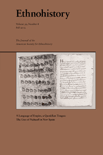
ETHNOHISTORY
Advancing Understanding of Cultural Dynamics Through TimeETHNOHISTORY is a prestigious academic journal published by DUKE UNIVERSITY PRESS, focusing on the interdisciplinary study of historical and anthropological methodologies. With its ISSN 0014-1801 and E-ISSN 1527-5477, the journal has made significant contributions to understanding the complex intersections of culture, history, and social dynamics since its inception in 1970. It holds a Q3 ranking in Anthropology and a Q2 ranking in History, reflecting its relevance in contemporary scholarly discourse, and boasts impressive Scopus rankings, placing it in the 77th percentile in History and the 45th percentile in Anthropology. While it does not operate under an Open Access model, the journal remains vital for researchers seeking comprehensive scholarly insights into the ethnographic historical record. The objective of ETHNOHISTORY is to foster dialogue among historians and anthropologists, ensuring the voices of marginalized communities and overlooked narratives are preserved and acknowledged in historical analyses. Researchers, professionals, and students will find invaluable resources and rigorous scholarship that provoke thought and inspire further exploration in the fields of history and anthropology at ETHNOHISTORY.

Focaal-Journal of Global and Historical Anthropology
Democratizing Knowledge for a Global AudienceFocaal-Journal of Global and Historical Anthropology is an esteemed academic journal published by BERGHAHN JOURNALS, focusing on the intricacies of global and historical anthropology. With an impressive impact factor and positioned in the Q1 category of anthropology for 2023, this journal is recognized for its exceptional contributions to the field, ranking #121 out of 502 in the Social Sciences category on Scopus. Since its transition to Open Access in 2020, Focaal has made significant strides in democratizing academic knowledge, allowing broader accessibility for researchers, professionals, and students worldwide. The journal provides a platform for interdisciplinary dialogue and critical analysis, paving the way for innovative research and thought-provoking discussions. With a commitment to fostering a deeper understanding of anthropological practices and their global implications, Focaal is an essential resource for anyone engaged in contemporary anthropological studies.
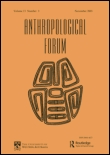
Anthropological Forum
Cultivating Scholarly Excellence Since 1963Anthropological Forum, an esteemed journal in the field of anthropology, is published by Routledge Journals, Taylor & Francis Ltd. With an ISSN of 0066-4677 and an E-ISSN of 1469-2902, the journal has cemented its reputation for fostering critical discussions and innovative research since its inception in 1963. Covering a broad range of topics within anthropology, it has achieved an impressive Q1 ranking in the category of Anthropology and a Q2 ranking in Arts and Humanities (miscellaneous) in 2023, showcasing its pivotal role in advancing scholarly discourse. With a Scopus ranking placing it in the top 10% of its field, the journal provides valuable insights into contemporary anthropological issues, making it an essential resource for researchers, professionals, and students alike. Although not an open-access journal, the comprehensive studies and articles published within its pages contribute significantly to the academic and professional community. Addressed out of Milton Park, Abingdon, UK, the Anthropological Forum remains a seminal platform for disseminating high-quality anthropological research.